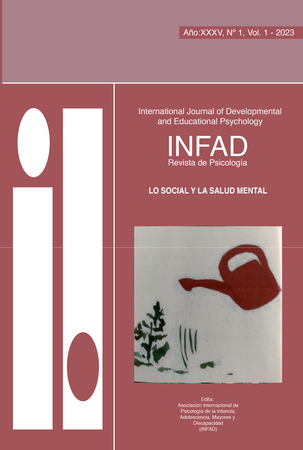Resiliencia académica en la enseñanza superior: un estudio de caso
Contenido principal del artículo
Resumen
La resiliencia es la capacidad de una persona, grupo o comunidad para atravesar adversidades, superarlas a pesar de las dificultades encontradas y ser capaz de crecer con ellas. En la enseñanza superior, muchos estudiantes tienen dificultades económicas, dificultades para conciliar trabajo y estudios, son incapaces de comprender los contenidos, además de los problemas familiares que pueden surgir, lo que puede provocar que abandonen el curso que eligieron. La resiliencia académica se define como la capacidad de atravesar las dificultades encontradas en el entorno educativo y superarlas, permitiendo a la persona crecer como resultado de esta situación adversa. Este estudio tuvo como objetivo analizar aspectos relacionados con la resiliencia académica de un estudiante de licenciatura en Física de una universidad pública brasileña que participó en esta investigación. Para mantener el anonimato, se le pidió al estudiante que nombrara una figura importante en su campo, y así se hizo llamar Einstein. Einstein afirmó que encuentra muchas dificultades en la enseñanza superior: falta de apoyo familiar para cursar una carrera universitaria, falta de tiempo para dedicarse al estudio porque necesita trabajar, asignaturas suspendidas que retrasan su graduación y falta de tiempo con su familia. A pesar de estos obstáculos, tiene la intención de terminar el curso para tener una vida mejor que la que cree que tiene hoy. Ha demostrado perseverancia, y el apoyo tanto de profesores como de familiares le impulsa a perseguir su sueño de graduarse. Este es un caso de resiliencia académica, porque a pesar de las adversidades
Detalles del artículo
Sección

Esta obra está bajo una licencia internacional Creative Commons Atribución-NoComercial-SinDerivadas 4.0.
Aquellos autores/as que tengan publicaciones con esta revista, aceptan los términos siguientes:
- Los autores/as conservarán sus derechos de autor y garantizarán a la revista el derecho de primera publicación de su obra, el cuál estará simultáneamente sujeto a la Licencia de reconocimiento de Creative Commons que permite a terceros copiar y redistribuir el material en cualquier medio o formato bajo los siguientes términos: —se debe dar crédito de manera adecuada, brindar un enlace a la licencia, e indicar si se han realizado cambios. Puede hacerlo en cualquier forma razonable, pero no de forma tal que sugiera que usted o su uso tienen el apoyo de la licenciante (Atribución); — no se puede hacer uso del material con propósitos comerciales (No Comercial); — si se remezcla, transforma o crea a partir del material, no podrá distribuirse el material modificado (Sin Derivadas).
- Los autores/as podrán adoptar otros acuerdos de licencia no exclusiva de distribución de la versión de la obra publicada (p. ej.: depositarla en un archivo telemático institucional o publicarla en un volumen monográfico) siempre que se indique la publicación inicial en esta revista.
- Se permite y recomienda a los autores/as difundir su obra a través de Internet (p. ej.: en archivos telemáticos institucionales o en su página web) antes y durante el proceso de envío, lo cual puede producir intercambios interesantes y aumentar las citas de la obra publicada. (Véase El efecto del acceso abierto).

Este obra está bajo una licencia de Creative Commons Reconocimiento-NoComercial-SinObraDerivada 4.0 Internacional.
Cómo citar
Referencias
Anana, E. S., Mello, S. P. T., Severo, P. S., & Borges, G. R. (2020). O sentido de pertencimento academico atraves da motivacao, atratividade e integracao a sociedade: a percepcao dos estudantes de turismo de universidades publicas do sul do Brasil. Reuna, 25(3), 18-38.
Angst, R. (2009). Psicologia e resiliência: uma revisão de literatura. Psicologia Argumento, 27(58), 253-260.
Cartaxo, S. R. M. (2014). Licenciaturas alfabetizadoras: a interlocucao dos cursos de licenciatura com os anos iniciais da educacao basica. Curitiba: CRV.
Cassidy, S. (2015). Resilience building in students: the role of academic self- efficacy. Frontiers in Psychology, 6, s.p.
Cassidy, S. (2016). The academic resilience scale (ARS-30): a new multidimensional construct measure. Frontiers in Psychology, 7, 1-11.
Graner, K. M., & Cerqueira, A. T. A. R. (2019). Revisao integrativa: sofrimento psiquico em estudantes universitarios e fatores associados. Ciencia e saude coletiva, 24(4), 1327-1346.
Gil, I., Maluf, E. C., Souza, T. S. C., Silva, J. Y. F., & Pinto, M. C. S. (2018). Analise transversal de sintomas depressivos em estudantes de Medicina: prevalencia no primeiro ano de graduacao. Revista PsicoFae, 7(2),99-118.
Lehman, Y. P. (2014). University students in crisis: university dropout and professional re-selection. Estudos de Psicologia, 31(1), 45-53.
Masten, A. S.; Cutuli, J. J., Herbers, J. E., & Reed, M. J. (2009). Resilience in development. Em: S. J. Lopez & C. R. Snyder (Orgs.) The Oxford handbook of positive psychology (pp. 117-131). 2a. ed. New York: Oxford University Press.
McKenzie, K. & Schweitzer, R. (2010). Who succeeds at university? Factors predicting academic performance in first year Australian university students. Higher Education Research & Development, 20(1), 21-33.
Merino, M. D., & Privado, J. (2015). Positive psychological functioning: evidence for a new construct and its measurement. Anales de Psicologia, 31(1), 45-54.
Oluwole, A., & Oyedun, O. S. (2014). Psychological predictors of post examination failure depression among pre-clinical medical and dental students in Ibadan Nigeria. American Journal of Medicine and Medical Sciences, 4(6), 216-222.
Priolo Filho, S. R., & Rodrigues, M. B. (2018). Resiliência e a promoção do desenvolvimento saudável na infância, adolescência e adultez: novas discussões dos conceitos psicológicos. Psicologia Argumento, 36(92), 163-174.
Rutter, M. (1987). Psychosocial resilience and protective mechanisms. American Orthopsychiatric Association, 57(3), 316-331.
Soares, A. B., & Del Prette, Z. A. P. (2013). Relacoes interpessoais na universidade: um guia teorico-pratico. Curitiba: Appris.
Yin, R. (2001). Estudo de caso: planejamento e métodos. 2. ed. Porto Alegre: Bookman.

